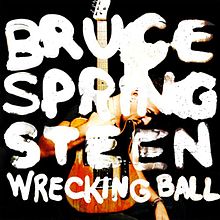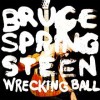 Orginally published by L.S. Media. March 7th 2012.
Orginally published by L.S. Media. March 7th 2012.
L.S. Media Rating ****
The Wrecking Ball is Bruce Springsteen’s 17th studio album and it has to be understood to be enjoyed. It has the appearance of being an angry introspection and commentary of the 21ST Century America that Bruce Springsteen finds himself living under. It is a world away from the days where flags were raised in standard to his work. This is Springsteen where Springsteen should have been. The golden working class idol, possibly one of the truest America has produced, returns to his roots and gives America and the world a damn good telling off.
The Wrecking Ball opens up with We Take Care of Our Own, a reflection that it hasn’t happened, not in America, the land of the free, not anywhere. We Take Care of Our Own is bitter, its personal and it is utterly correct. There is no cavalry coming to the rescue, the insidious dream is over and the bugle horn that he sings of with such disdain is obviously not going to be heard, not yet anyway.
Perhaps the most appealing and strongest attack on a dream that died is the haunting Jack of all Trades, it’s beautiful, it is extreme and a completely powerful message of the way that Wall Street, The City of London, the bankers that speculate on nations fate and in recent times has seen countries almost becoming bankrupt whilst some that have more money than any resemblance of humanity complain they cannot exist on the millions they receive every year. It’s gratifying to hear the Boss speak easy of finding the b******s and righting a few wrongs.
Perhaps the most poignant moment in the C.D, doesn’t appear in the expansive and brilliant lyrics but in the sleeve notes. There is a dedication to the legend that is Clarence Clemons, one of the Boss’s best friends and a music sensation that has stood aside Bruce Springsteen on stage and forever on record.
The dedication to the much missed sax player will bring a fresh tear to the eyes of all who venture into Springsteen’s new album. It would be folly to write it word for word, it would take away the pleasure and pain of reading a note from one friend to another. It is enough to write the last part, it’s enough to understand the friendship that only some of us are lucky to actually find in life.
“Clarence was big and he made me feel, think, love, and dream big. How big was the big man? Too f*****g big to die. You can put it on his gravestone, you can tattoo it over your heart. Clarence doesn’t leave the E Street band when he dies. He leaves when we die.”
This is not just an album that deals with the loss of a valuable friend but also a record of amazing introspection and deep intense look at the current state of America and the world in general. It is an album of such truthful emotion that has the power to change even the most stubborn of minds on Bruce Springsteen’s work.
Ian D. Hall
